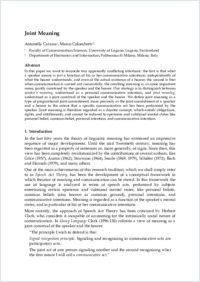Joint meaning
- Carassa, Antonella Istituto di Psicologia e Sociologia della Comunicazione (IPSC), Facoltà di scienze della comunicazione, Università della Svizzera italiana, Svizzera
- Colombetti, Marco Istituto di tecnologie della comunicazione (ITC), Facoltà di scienze della comunicazione, Università della Svizzera italiana, Svizzera
-
2009
Published in:
- Journal of pragmatics. - Elsevier B.V.. - 2009, vol. 41, no. 9, p. 1837-1854
Speaker's meaning
communicative intention
communicative act
deontic affordance
deontic uptake
joint commitment
joint meaning
English
In this paper we want to reconcile two apparently conflicting intuitions: the first is that what a speaker means is just a function of his or her communicative intentions, independently of what the hearer understands, and even of the actual existence of a hearer; the second is that when communication is carried out successfully, the resulting meaning is, in some important sense, jointly construed by the speaker and the hearer. Our strategy is to distinguish between speaker's meaning, understood as a personal communicative intention, and joint meaning, understood as a joint construal of the speaker and the hearer. We define joint meaning as a type of propositional joint commitment, more precisely as the joint commitment of a speaker and a hearer to the extent that a specific communicative act has been performed by the speaker. Joint meaning is therefore regarded as a deontic concept, which entails obligations, rights, and entitlements, and cannot be reduced to epistemic and volitional mental states like personal belief, common belief, personal intention, and communicative intention.
- Language
-
- English
- Classification
- Information, communication and media sciences
- License
-
License undefined
- Open access status
- green
- Identifiers
-
- RERO DOC 12291
- DOI 10.1016/j.pragma.2009.03.005
- ARK ark:/12658/srd1317934
- Persistent URL
- https://n2t.net/ark:/12658/srd1317934
Statistics
Document views: 227
File downloads:
- Texte intégral: 444
